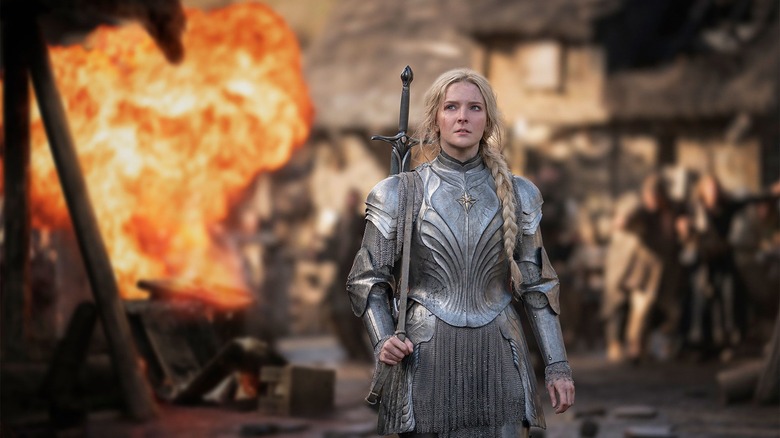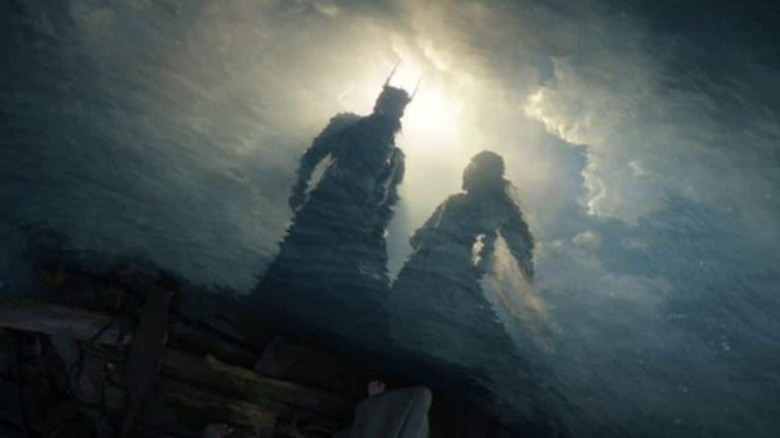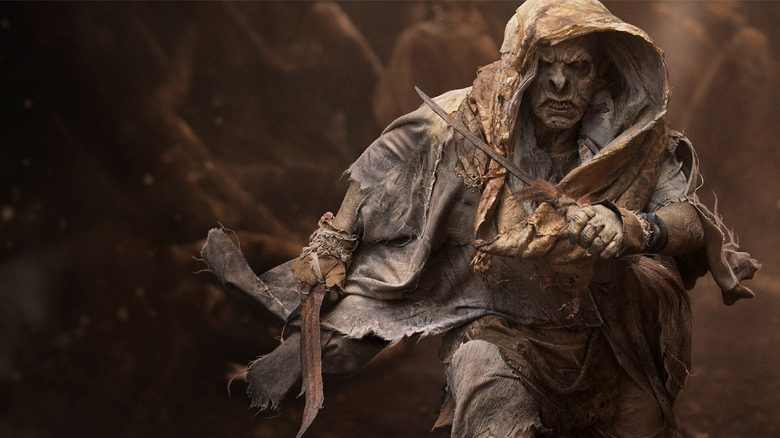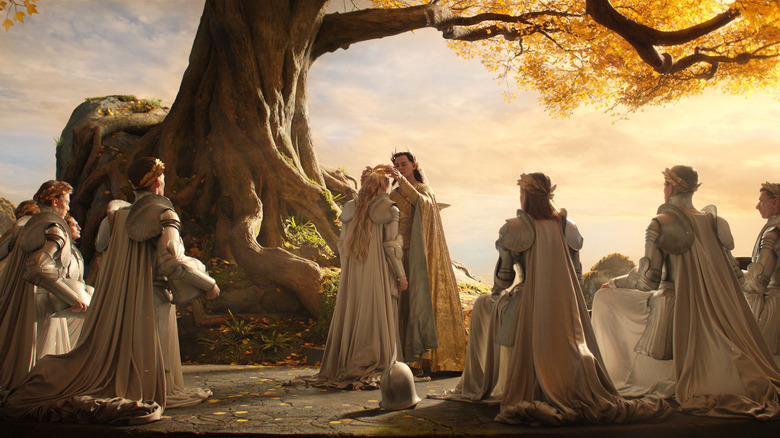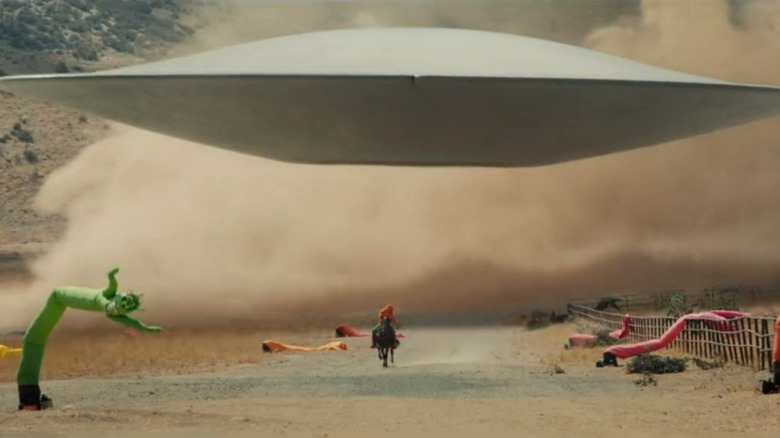The Rings Of Power Orchestrators Break Down Bear McCreary's Epic Score [Exclusive Interview]
Orchestrators Jonathan Beard, Ed Trybek, and Henri Wilkinson are known as the Tutti Music Partners, and they had a gargantuan task in bringing composer Bear McCreary's score to life for "The Lord of the Rings: The Rings of Power." Each episode contains around an hour of music, which the trio completed in a span of six months. With a massive orchestra, each episode was about as challenging and as enjoyable as orchestrating for a feature film.
Beard, Trybek, and Wilkinson are no strangers to McCreary's compositions. They've been working with the composer since 2009 on a variety of projects, including "10 Cloverfield Lane," "Godzilla: King of the Monsters," and "Happy Death Day 2U." They have a deep understanding of his music and what he does or doesn't need. The Tutti Music Partners are the orchestrators behind a long list of memorable scores, and recently, the busy trio took the time to discuss with us their work on "Rings of Power."
'There's this pulsing baseline that goes all the time in Sauron's theme'
(Warning: Spoilers for season 1 ahead.)
You worked on the music without picture, which is unusual. How was it seeing the end result?
Wilkinson: First of all, it's an immense treat always to actually see the music come together with dialogue and the story and the amazing visuals. For us, the first time that we actually get to experience the music is at the recording sessions, which is when we first get to experience something like, "Okay, this is how it sounds with the live orchestra." And that's usually a huge treat for us, especially in this project where the ensembles that we had were just so massive on every scale, in every portion.
Beard: Just to add one thing to that, it's been an interesting exercise in this particular project to hear the musical story being told essentially completely in advance of seeing the visual story. And so seeing those come together, it gives us an even deeper respect for what Bear McCreary has done with his composition for the score, in terms of the little things he's weaving in here and there to tell the story musically, to deepen the story that you're seeing visually. So to see that all finally come together is definitely a treat, like Henri said.
Trybek: I agree with my compatriots, of course. But also, I mean, look, we're all huge fans of this series in general and have really enjoyed the show, and it's been incredible to see. Have you seen the last episode?
Yes.
Trybek: You see it in all these reveals and, "Okay, here's what this is and here's who this is." And then to actually — because we've heard the music and they're like, "Oh, that's cool. There's this theme in that theme." And then to see what Bear was really doing against the visuals with these themes and how this is almost an inversion of that theme and this is how they're working together against each other, both as a musical whole where you're like, "Oh, that sounds great, cool, awesome film music," and then you see it work against the picture and realize like, "Oh, it works so well against the picture, too." It's just an absolute treat.
What were the notes you were hitting for Sauron's theme and his reveal?
Trybek: The thing is we knew, it was like, "Okay, this is Sauron's theme from the start. Here's that music, here's what it is." So you can take Halbrand's theme, and it's not an exact inversion, but it's close to an inversion of what Sauron's theme is, and to hear how Bear had twisted the two together here at the very end of it, you're just like, "Oh, what a cool musical [tactic]." And maybe people won't ever consciously even realize that musically. It's kind of for all us music nerds who are just like, "Yeah, what a cool thing to subtlety add in there." But I think on a more subconscious level, that level of thought on Bear's part has permeated the score and elevated the whole thing.
Beard: Just to add one thing quick to that, Bear has talked in interviews a lot about how he made the opening musical note interval of every main character's theme in the show different from all of the other character themes. In theory, you can basically know from the first two notes you hear any time what character's theme you're listening to. The thing that's cool with Halbrand is the first two notes that get associated with Halbrand for so much of the season, they're not the first two notes of the melody of Sauron's theme, but there's this pulsing baseline that goes all the time in Sauron's theme, and it's interesting how those intervals end up tying together. So it's like he's weaving it in at different levels simultaneously.
'Oh, I just want to hear a beautiful flute'
You've all been working with Bear for many years now. When collaborating on "Rings of Power," what is both discussed and left unsaid about the score?
Wilkinson: We started talking to him about three months before we actually started the orchestrations on this project. He brought us all together, the four of us, and just sat us down and we had a Zoom meeting. Before that, I should say we all had to sign NDAs, and they were all very mysterious and we were like, "Okay, okay. What's going to happen? What's going on?" And then of course he told us what's coming.
He started talking about his vision for the music and the colors and instrumentation and all the things that he had started thinking about thematically a few months before we started the meat and grind of the orchestration work. And so that way, once we actually got to the actual work process, we had an idea already of the musical language that Bear was visualizing. We knew what the palette was that we could be working with and what kind of colors he had in his mind that we could have at our disposal.
Beard: And in terms of the process of receiving that from Bear and working back and forth together, we do certainly, because we've worked with him for such a long time now, have a good shorthand. A lot of Bear's process can go relatively unspoken between us, and he trusts us to know what he's going for. But like Henri was saying, due to the complexity of this score, there was a lot more discussion going on about how to use this gigantic canvas at our disposal. It was really, really fun.
Horror is a part of "Lord of the Rings," especially with the orcs and Sauron. What do you find unique about how Bear creates a sense of horror?
Trybek: On a horror front, I have to say, they're both a fun thing to do and also kind of a tiring thing to do because it involves creating an orchestral effect that's horrifying, or sometimes, let's say, rather unpleasant to listen to in and of itself. We're sitting there listening over and over and over and over again. At a certain point, you're just like, "Oh, I just want to hear a beautiful flute. Just anything but these clusters hitting me again." But as you said, there's a lot of these moments in this score where it is horrific, especially when you're talking about the Orcs, and sometimes the music almost is straight out of a horror film.
I would say the biggest difference is, as we mentioned before, the canvas that we had on this. I mean, it was just such a massive thing. Most horror movies are typically done in a smaller scope, whereas Amazon went all out. So we actually had more to draw upon with that, and even when there's horror, it's almost more old school horror where it's not just, "Oh, here's a block of strings going na na na na." It's also where there's these little twisted woodwinds intertwining on it to help add to that texture that you don't always get to have.
Wilkinson: And since we had a massive choir for every episode, we also had those colors at our disposal. So often, we would experiment with different types of colors that would add to that, like you said, horror experience. We were experimenting with having the choir add another layer of rusty voices, like "Nampat" [Editor's note: "Nampat" means "death" in Black Speech], that he could layer on top of that, [which] would subconsciously just add to the horrific-ness of the Orcs and all that stuff.
How much variety is there in the choir? Sometimes when you hear a solo, it almost sounds like it could be a whole team.
Beard: There are definitely times when there are solo voices, and Bear featured a number of different vocal soloists on the score. But you get everything in between. Sometimes you have just the low men singing this guttural stuff for the Orcs, for example. You've got all the men doing this creepy choral theme as part of Sauron's theme. And then you go all the way through — in the Valinor thematic material, it's really pure. There's a combination of the children's choir with female vocals and you get this angelic sound, and then all the way to, say, a solo voice representing Galadriel in her theme that shows up in a couple spots.
In episode 2, when she goes underwater, that was represented by just one female vocal, the solo soprano. It comes back here in episode 8 when she's underwater again, this time in her memory. And there's one other time where that solo vocal comes up for her as well in a profound way. Bear is using the thickness of the textures very consciously in his approach.
'Not all cues are created equal'
There are these big, complex battle sequences that of course require similarly dense music. I was wondering, though, what challenges come with orchestrating the seemingly simple walk-and-talks on this show?
Trybek: It kind of depends on which walk-and-talk or which scene you're talking about. Not all cues are created equal, regardless of what project it is. But I think on this show in particular, Bear really puts so much attention that even what, let's say, would normally be like, "Oh yeah, I'll take that cue. That's a nice simple cue. Let me do that one. You take the big horror action five minute nasty thing and I'll take this little flute and heart thing." Or in this case, maybe oboe and harp. But those are the ones where there's still a lot of detail to be worked out, and so there can still be a difficulty in figuring out the subtleties of it and be consciously worrying about, "What is this tessitura?" and then sometimes that's where our conversations with Bear will go back and forth.
We're like, "Hey, you scored this, you said you wanted an oboe, but given the tessitura, do you want this timbre or do you want this timbre? Should we change it to an English horn or an oboe d'amore?" We'll have back and forth if we have an idea that's sort of in addition to Bear or possibly a slight modification. And sometimes Bear's like, "Oh, that's a great idea. Absolutely. Fantastic." Other times he's like, "Absolutely not. I want exactly this thing that I stated for a reason." And it's like, "Okay, all right. Forget it. It was a terrible idea. Sorry, I brought it up." [Laughs]
Beard: Full veto power all the time.
Circling back to horror, which instruments do you think can really instill fear in an audience?
Wilkinson: Harmonica.
Beard: [Laughs] It depends. It depends how you use them. You can make any instrument be incredibly unsettling. Well, to use an example, not from this show but from this composer, I think that Bear McCreary has made toy pianos pretty horrifying forever with "Child's Play." In an orchestra, what do you think guys?
Wilkinson: In orchestra setting, there's obviously a lot of effects that he can do with various sections.
Trybek: If it's something more bombastic, then you're probably going to have starling brass and crazy percussion and all sorts of low strings doing nasty stuff. Or if we're just waiting for something to happen, and all it is a single note just, "Eee." It's got you on the edge of your seat ready to go through the ceiling. So honestly, everything can work.
Wilkinson: Everything can. And it's like you said earlier, Jack, about the walk-and-talks and stuff like that and that kind of situation, it'll be more like Ed was saying, the kind of eerie, psychological horror that you almost don't even register on a cognitive basis. But then again, if you have full-on action scenes with sound effects and all sorts of stuff, of course you can be more bombastic with the music as well and have huge brass effects going on and whatnot.
What were some questions you had for Bear regarding the final episode?
Beard: Musically, there are some wonderful textures that get introduced in the last two episodes of the season. It's going to be exciting to see if they continue to play out in future episodes. When recording the last episode, some of the really beautifully circular flowing, epic string writing that Bear did, it's trying to figure out, "Hey, how aggressive is this supposed to be? Are we going for something more in-your-face bombastic? Are we going for something more dazzling and magical? What do we need the tone of that to be?" And Bear's right there ready to answer those questions as we need. But those are some of the types of things we might need to figure out musically as we're recording.
'Here's the music carrying you forward'
You all worked on "Nope." That score was fantastic, especially to experience in IMAX. [Composer] Michael Abels was happy the score just filled the space, the environments. Was that ever a direction he gave you on that movie?
Beard: Yeah, that direction definitely came from Michael, so conversations are going on back and forth in terms of how best to execute that. Similar to Bear, Michael has clear ideas of what he wants to do and a deep knowledge of the orchestra. Our job is basically just to help finesse the final fulfillment of his vision. But he was incredibly involved with that and very clear ideas of how he wanted to get there.
Trybek: Michael knows what he wants. For example, two things I can think of in "Nope," the main title, there were actually two things. We had to have two different scores for it because it's against that picture of the horse running. He had one piece of music going there, but then there's another piece of music that comes in that's actually in a different tempo and stuff is juxtaposed against itself. Michael had that in his head and we're looking at it [going], "Okay, I mean, we're going to do what you want here, but how is this going to work?" And then of course, it's unbelievably cool.
Another example is the theme park music where we actually had, let's say, a slightly larger than standard Americana orchestra, like extra horns and trumpets and things. And so he wrote it with that smaller orchestra in mind and we provided options for the big one. As I recall, he was like, "No, no, I want to use the smaller, pared down one because that's actually more the sound."
We're there to provide options and to facilitate them in case he's like, "Hey, why don't we add in two extra horns?" And we're like, "Got it. Ready to go." Or if he's just like, "No, no, no, no, I don't need those two, that makes it too big. I need four, not six." I mean, that's the nitty gritty details for us that are fun to do.
Beard: We tried out different elements of the options that we had given him and it allows him to pick, choose, and combine a little bit into what that perfect ultimate balance is going to be for him.
When you hear your work in a theater, say if the sound system isn't up to par, does it drive you guys nuts?
Trybek: Well, if there was a time we didn't like it, we're not going to admit it. I think generally speaking, it's always just a treat.
Beard: It is.
Trybek: You sit there and you're like, "I remember recording that. I remember working on that." And it's still a treat because I go back to when I was a kid and saw "Batman." I was in the theater and just like, "Oh, this is so dope." It's still the same feeling except now I'm like, "And I'm working on it." So to me, it's always been amazing. The only general thing is, I generally want the music to be louder than it is. But that being said, "Rings of Power” is an example where the music actually has a lot of moments to shine front and center. They've written it in such a way where there's just space. There's no effects, there's no dialogue and it's just like, "Here's the music carrying you forward into this scene," whereas, "This army is leaving or this army's coming or whatever." It's like, "Whoa."
Wilkinson: And that's great that they did that. I mean, of course the music is supposed to act in a not necessarily present way all the time in every single product, but to be able to hear the final product is immensely pleasurable. I always make sure if I'm watching something that we've worked on, I try to not watch it on crappy headphones or something like that. I try to have a good sound wherever in my living room or whatever, so I can really enjoy it. I have to say, when I watched the finale, there were several times where I got chills because of the way the music acted with the drama and seeing that all come together is fantastic.
"The Lord of the Rings: The Rings of Power" season 1 is now available to stream on Prime Video.
